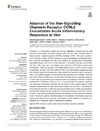Please use this identifier to cite or link to this item:
https://accedacris.ulpgc.es/jspui/handle/10553/74928
| Title: | Absence of the Non-Signalling Chemerin Receptor CCRL2 Exacerbates Acute Inflammatory Responses In Vivo | Authors: | Regan-Komito, Daniel Valaris, Sophia Kapellos, Theodore S. Recio Cruz, Carlota Pilar Taylor, Lewis Greaves, David R. Iqbal, Asif J. |
UNESCO Clasification: | 3207 Patología | Issue Date: | 2017 | Project: | FS/11/82/29332 PG/10/6028496 RE/13/1/30181 MR/K017160/1 |
Journal: | Frontiers in Immunology | Abstract: | Chemerin is a chemotactic protein that induces migration of several immune cells including macrophages, immature dendritic cells, and NK cells. Chemerin binds to three G protein-coupled receptors (GPCRs), including CCRL2. The exact function of CCRL2 remains unclear. CCRL2 expression is rapidly upregulated during inflammation, but it lacks the intracellular DRYLAIV motif required for classical GPCR downstream signalling pathways, and it has not been reported to internalise chemerin upon binding. The aim of this study was to investigate what role if any CCRL2 plays during acute inflammation. Using the zymosan- and thioglycollate-induced murine models of acute inflammation, we report that mice deficient in the Ccrl2 gene display exaggerated local and systemic inflammatory responses, characterised by increased myeloid cell recruitment. This amplified myeloid cell recruitment was associated with increased chemerin and CXCL1 levels. Furthermore, we report that the inflammatory phenotype observed in these mice is dependent upon elevated levels of endogenous chemerin. Antibody neutralisation of chemerin activity in Ccrl2−/− mice abrogated the amplified inflammatory responses. Importantly, chemerin did not directly recruit myeloid cells but rather increased the production of other chemotactic proteins such as CXCL1. Administration of recombinant chemerin to wild-type mice before inflammatory challenge recapitulated the increased myeloid cell recruitment and inflammatory mediator production observed in Ccrl2−/− mice. We have demonstrated that the absence of CCRL2 results in increased levels of local and systemic chemerin levels and exacerbated inflammatory responses during acute inflammatory challenge. These results further highlight the importance of chemerin as a therapeutic target in inflammatory diseases. | URI: | https://accedacris.ulpgc.es/handle/10553/74928 | ISSN: | 1664-3224 | DOI: | 10.3389/fimmu.2017.01621 | Source: | Frontiers in Immunology [1664-3224], v. 8, 1621 |
| Appears in Collections: | Artículos |
WEB OF SCIENCETM
Citations
22
checked on Feb 1, 2026
Page view(s)
71
checked on Jan 10, 2026
Download(s)
53
checked on Jan 10, 2026
Google ScholarTM
Check
Altmetric
Share
Export metadata
Items in accedaCRIS are protected by copyright, with all rights reserved, unless otherwise indicated.
